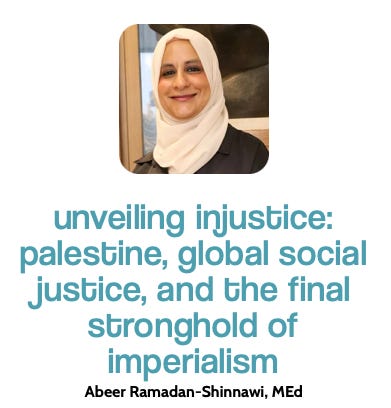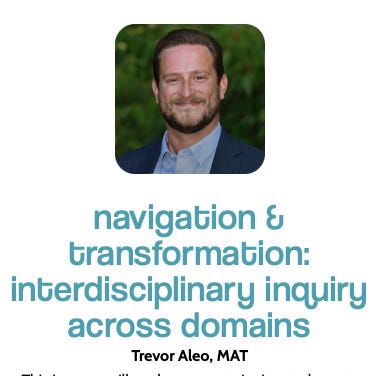I have to declare from the outset that I am not objective about the Human Restoration Project, a nonprofit outfit founded by Chris McNutt and Nick Covington with the goal of “informing, guiding, and growing a movement toward a progressive, human-centered education system.”
I’ve been a member of their board since their founding and have watched them grow from a part-time project by two full-time teachers into a growing powerhouse running multiple programs designed to directly and positively impact the lives of teachers and students.
One of their projects is the (now annual) Conference to Restore Humanity, a virtual event designed to bring folks together to talk about how to make schools and classrooms friendlier to the needs of the humans that work and learn within them.
I pulled Nick and Chris from one of their weeks of delivering professional development programming to answer some questions about the conference because I think at least some of the folks subscribing to this newsletter might be interested.
(Note: Early bird registration runs through the weekend, so act soon!)
John Warner: As someone who is on the Human Restoration Project board for another couple of months, and therefore has an advisory role for you, the leaders of the organization, I’m here to tell you that organizing a conference is probably a bad idea. Time consuming, costly, a potential logistical nightmare, you name it, and yet here you are putting on a conference…again.
Why?
Nick Covington: Even after all we had lived through in 2020-21, and the institutional cracks the COVID pandemic revealed, I think 2022 was the beginning of the push for a “return to normalcy.” But that return also demanded forgetting the lessons about how “normal” wasn’t that great to begin with for a lot of people. That was really the driving force behind our first virtual Conference to Restore Humanity: while everyone else was going “back to normal”, how could we purposefully design an online learning space that was accessible, sustainable, and representative of the communities we claim to serve? The goal of our work is to intentionally foster a community of educators who know that we must reimagine education to have a thriving future.
JW: I don’t want to say that I was hopeful exactly about changes coming out of the most acute pandemic period, but it seemed like we had a fresh collective awareness in some of the ways that school was not serving students (or faculty or staff for that matter) well. But it’s like those lessons have been memory-holed, even as everyone has clearly been scarred by that period. It’s weird.
Chris McNutt: I think we underestimated how much people wanted to recapture that feeling of "normalcy" -- especially when we know how overworked teachers were as schools attempted to adjust with masking, hybrid options, cleaning procedures, etc. I worked way harder than I had ever before, and I'm sure many folks just wanted the comfort of their "old job" back. (But of course, these changes were necessary for everyone's safety.)
This is why our work at HRP acknowledges two seemingly conflicting ideas: the need to undertake the essential task of reimagining schools, while also professionalizing teachers and reducing their extensive working hours. We are firm believers in systems-based thinking, that we need to tackle problems at the root rather than adding on new "one-and-done" perceived solutions.
JW: How do you use a conference format to create that sense of community? These things can be pretty static. You watch some presentations, maybe a little Q&A, maybe you learn something, maybe you don’t. How does the experience become lasting?
NC: The unique format allows participants to be in community with a huge range of people and perspectives from around the world. So it’s been heartening to see that community grow as we iterate on our original design and have familiar faces return and new folks join us each year.
CM: Specifically we use Discord, which has been a game-changer for us. It allows people to chat, join calls, and have deeper conversations beyond Zoom, simulating the informal 'hallway' or 'bar chat' that I believe is the most valuable part of any conference. This Discord space remains active even after the conference ends. While it's not quite the same as meeting in person, it's much more affordable, accessible for all attendees, and eco-friendly. It's important to note that we aren't just trying to replicate an in-person conference. Instead, we're leaning into virtual spaces as a way to collaborate that was previously impossible.
Our motivation to continue this conference comes from the connections we create between people who are dedicated to rethinking education. We want to show that there are others around the world working in similar ways. When I was teaching, I felt fairly isolated. I could find resources online from random professional websites, but it felt like I was haphazardly trying things without much to fall back on. What excites me about our community is seeing how many people are engaged in this work, with us serving as a conduit for them to listen and learn from each other.
JW: It’s strange to think that teaching, an activity during which you’re surrounded by other people who are ostensibly in pursuit of the same goal you are - teaching if you’re a teacher, learning if you’re a student - can feel lonely or isolating, but I had the exact same experience teaching college writing. I often felt like there had to be a better way of going about things, but I didn’t have anyone I could (knowingly) turn to in my immediate vicinity.
CM: Sadly, questioning the overall structure or system – grading, homework, “classroom management” – is such a tall task that a sizable number of folks simply quit or become jaded before they find a community like this. The task of changing education feels so insurmountable that proposing something different seems ludicrous. And, there are plenty of questionable organizations who have capitalized on a “one-size fits all solution” that they promise will make education better. Hopeful educators buy into these promises and burn out as they just simply don’t work – a “fad trap.” The work of “restoring humanity to education” applies to young people and adults.
We want attendees at our conference to not only see complex, nuanced, and researched ideas on building a human-centered education, but build a community of like-minded peers who can support each other. One way we do this is by flipping our keynotes – attendees watch a ~30m video of the presentation, then engage in an hour live Q&A. We lean into events that lead with discussions and panels so that knowledge is shared among the community rather than just speaker to audience.
JW: Not only are people who feel like they want to create a human-centered classroom very common, you’ve got some very interesting people who share these values participating in the conference. If we were smarter about marketing, we would’ve led the discussion with them.
NC: It’s often the case that “evidence-based” is a label used to reinforce traditional practices and structures of school. But USC’s Dr Mary Helen Immordino-Yang has been doing incredible work out of the Center for Affective Neuroscience, Development, Learning and Education (CANDLE) that, in her words, makes the neurobiological case for progressive education. Dr Carla Shalaby challenges traditional disciplinary practices, emphasizing critical pedagogy in elementary schooling.
Dr Sawsan Jaber elevates the voices of Arab and Muslim students as an advocate for global equity and justice.



And Orchard View Innovative Learning Center is a public adult learning and high school completion center with an entirely different approach to “what works” for what is traditionally called “alternative education”, offering instead an inclusive, self-directed path for learners who could not complete their high school education in a typical setting. Chris and I have been on site twice and it’s an incredibly powerful experience.
All of these flipped keynotes challenge the idea that “what works” ever really worked, or was even desirable, in the first place.
CM: We also have week-long courses to deeply engage in one of two spaces: Trevor Aleo, a high school English teacher, is leading sessions on multimodal learning (zines, podcasts, YouTube, TikTok, etc.) and Abeer Ramadan-Shinnawi, an advocate and consultant, is hosting sessions on historical/current events in Palestine and what that means for social justice in education.


And last but certainly not least, we have a variety of events (educator panels, showcases) and a line-up of virtual school tours – overviews of innovative practices with extensive panel Q&As with students, teachers, and administrators – featuring schools from across the United States. Everything can be attended live, but is also recorded to account for time zone differences – especially for international attendees. (Plus, we transcribe everything!)
Also, these guys made a trailer.




